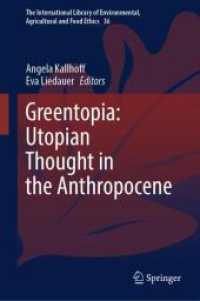- ホーム
- > 洋書
- > 英文書
- > Politics / International Relations
Full Description
Available open access digitally under CC-BY-NC-ND licence.
How do international climate and energy organizations survive and thrive despite powerful contestation? This analysis reveals how the United Nations Framework Convention on Climate Change (UNFCCC) and the International Energy Agency (IEA) maintain legitimacy when key players like the United States withdraw from global agreements.
Using qualitative research including interviews and participant observation, this book unveils the 'norm for climate change action'—a powerful principle that transforms contestation into reinforcement of international climate governance. In doing so, it demonstrates how opposition doesn't destroy these organizations but paradoxically strengthens their role in global climate action.
Contents
1. Introduction
2. Understanding Norms as Guiding Frames in Contestation-Legitimation-Processes
3. Emergence of the Norm for Climate Change Action: The UNFCC and Contestation of Global South
4. The UNFCC, US Contestation and Guidance by the Norm for Climate Change Action
5. Contesting Along the North-South Divide: The International Energy Agency Turning to Collective Action
6. Frozen in Time: The International Energy Agency Moving Towards Climate Change Action
7. Comparing Cases: Climate Change Action Across the Climate-Energy-Nexus
8. Conclusion: Contestation and Legitimation of IOs in the Global Climate Regime








